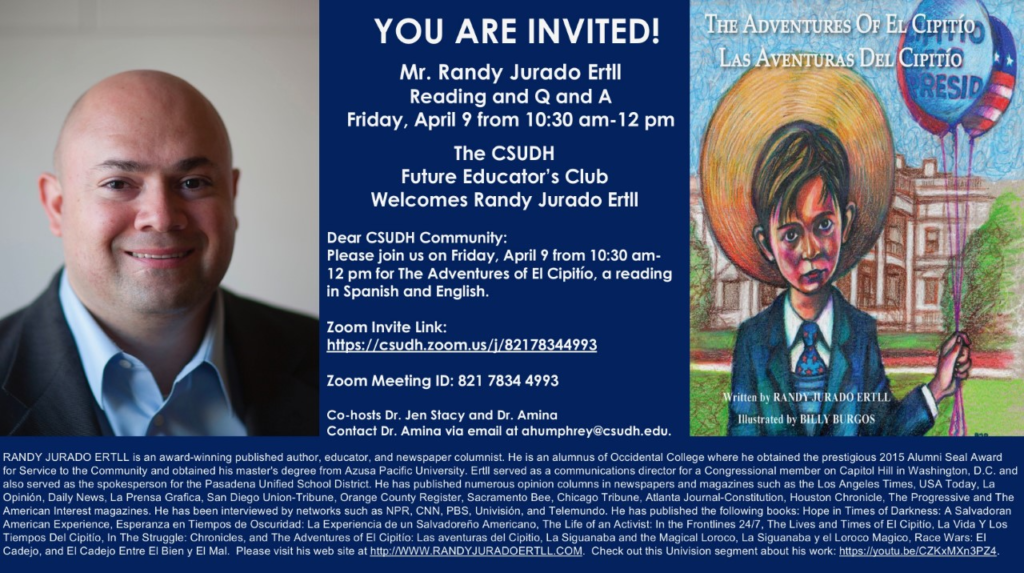When I was a student at Occidental College, I remember a Latina student asking during lunch at Clancy’s if we were going to Cesar Chavez’s funeral. I innocently asked, “Who is Cesar Chavez?” Her jaw dropped. She simply could not believe that I did not know about Chavez. In the 1980s and 1990s most public school textbooks did not include the history or contributions of activists such as Cesar Chavez.
After Chavez’s passing on April 23, 1993, I kept hearing his name. Then I started learning about the United Farm Workers (UFW). Eventually, I joined MEChA/ALAS Movimiento Estudiantil Chicano de Aztlan/Assocation of Latin American Students, at that time, the only Latino student club at Oxy. Then, we decided to form the Central American Student Association (CASA), a bold but necessary move. Unknowingly, we were following Chavez’s example of organizing and assuming leadership.
Just making it to school, and back home, without getting jumped, beaten, or shot was a priority. Unfortunately, the violence was also present within the school, on a daily basis.
Of course, we were not in the agricultural fields; we were engaged in urban political and social issues. My struggle as a child, and young man, was growing up on the dangerous streets of South Central. Just surviving, going to school there, was quite an achievement. Just making it to school, and back home, without getting jumped, beaten, or shot was a priority. Unfortunately, the violence was also present within the school, on a daily basis.
Many immigrant and non-immigrant Latino students were victims of bullying and hate crimes that were usually not taken seriously, nor reported by school authorities. As students, we were forced to remain in our geographically designated public school. We had no options or choices. Issues of gangs and race issues were too complicated for the adults to address and solve. Many of the school board members, administrators, educators/teachers did not live in South Los Angeles.
As young students, we were trapped and we had no political leaders to stand up and speak for us.
As young students, we were trapped and we had no political leaders to stand up and speak for us.
A few years later, I was very fortunate to have applied and attended Occidental College, since it is a small enclave of intellectual students and wonderful professors. There, I began reading about the Chicano struggle and about Chavez and the civil rights movement here in the United States. But I noticed that no discussions about Central American politics and history were taking place.
Central Americans did not have a Cesar Chavez. The closest person we had to Chavez was Archbishop Oscar Romero who was busy organizing and speaking up for the poor in El Salvador. Some leaders within the Catholic Church did not particularly like nor support Archbishop Romero since they labeled him a communist. In a major ironic twist, in 2018 the Vatican (the Catholic Church) officially proclaimed him Saint Oscar Romero. Now many of his detractors within and outside the Church may now have to pray and ask forgiveness for the defamation and pain caused to Romero, the man.
It is interesting that both of these iconic heroes are celebrated within the same week in March. Chavez was born on March 31, 1927. Romero was assassinated on March 24, 1980. They had something much more in common: an unbreakable belief in Catholic spirituality and a true commitment to social justice.
Today, both men have been sanctified and transformed into iconic figures. Yet, while alive, they were quite controversial and many turned their backs on both men.
Chavez was a renegade, a rabble rouser and a rebel to certain power structures. Yet, he was an American who had served in the Navy and was a staunch supporter of United States policies.
Both Chavez and Romero eventually chose not to follow certain established rules or regulations, or political policies or inhumane laws set by bureaucrats and politicians. They followed the hearts of the people.
Both Chavez and Romero eventually chose not to follow certain established rules or regulations, or political policies or inhumane laws set by bureaucrats and politicians.
They followed the hearts of the people. They took the time to meet with and talk to the poor. They did not ignore their pain or pleas. They chose to champion their needs and became spokespeople for the underprivileged.
They were willing to fight for the invisible people in our society. They both had an extraordinary connection and commitment to farm workers.
It was the campesinos (farm workers) that revolutionized and open the heart and mind of Romero. He met with them often and personally witnessed their pain and suffering. He decided to take on their fight for respect and equality. He chose to give his life for the Salvadoran people.
Chavez made a similar choice. He chose to give his life to the farm worker movement. Of course, he had flaws, just like Romero had flaws. They were not perfect and never themselves proclaimed to be saints. Even Chavez’ wife, Helen, once shared in a meeting that “Cesar was no saint.”
It is quite ironic that the Catholic Church turned its back on Romero when he became politically involved by denouncing human rights violations in El Salvador. Not that the Catholic Church designated him a Saint, would Romero have wanted or accepted such a thing? Most likely not. He was a humble man. Nonetheless, he has now been embraced by political parties that continually use his image at rallies and invoke his memory.
Today, Chavez is also embraced by many political circles. When both men were alive, they made many uncomfortable. But both men organized people, mobilized politically and sacrificed their health and safety by standing up to injustices. They did not sell out or become allies of the oppressors.
The powers that be were not able to buy off Chavez or Romero. They were not willing to sell their principles. They were men of integrity and principles. They shunned material possessions and wealth. They were not cursed with one of the deadly sins, greed. Rather, they were blessed to be peacemakers.
However, we cannot deny that Chavez was not fully supportive of undocumented immigrants. He was not necessarily enamored of undocumented immigrants from Central America who allegedly had communist/socialist leadings or those who he perceived as a threat to the legally documented farm workers. He may have become more sensitive toward all immigrants after passage of the Immigration Reform and Control Act (IRCA) in 1986.
What is true is that no one owns the legacies of Oscar Romero or Cesar Chavez. They were bigger than any political party or special interest. Both men were free spirits and courageous rebels, trouble makers, by nature who gave their lives unconditionally to help others.
A great example that our students can take to heart and follow: to help and uplift the most vulnerable in our society. To stand up for the bullied and oppressed. To give a voice to the most destitute in society. To become future leaders who will help to tackle our social, political, and economic inequities that create and cause so much pain.
Now, that is a great example that our students can take to heart and follow: to help and uplift the most vulnerable in our society. To stand up for the bullied and oppressed. To give a voice to the most destitute in society. To become future leaders who will help to tackle our social, political, and economic inequities that create and cause so much pain.
Our students need to become healers, peacemakers, and leaders who will protect, denounce, and repudiate hate at all times.








